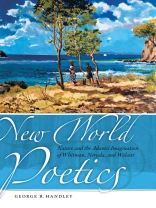A simultaneously ecocritical and comparative study, New World Poetics plumbs the earthly depth and social breadth of the poetry of Walt Whitman, Pablo Neruda, and Derek Walcott, three of the Americas‘ most ambitious and epic-minded poets. In Whitman’s call for a poetry of New World possibility, Neruda’s invocation of an ‚American love, ‚ and Walcott’s investment in the poetic ironies of an American epic, the adamic imagination of their poetry does not reinvent the mythical Garden that stands before history’s beginnings but instead taps the foundational powers of language before a natural world deeply imbued with the traces of human time. Theirs is a postlapsarian Adam seeking a renewed sense of place in a biocentric and cross-cultural New World through language and nature’s capacity for regeneration in the wake of human violence and suffering.
The book introduces the environmental history of the Americas and its relationship to the foundation of American and Latin American studies, explores its relevance to each poet’s ambition to recuperate the New World’s lost histories, and provides a transnational poetics of understanding literary influence and textual simultaneity in the Americas. The study provides much needed in-depth ecocritical readings of the major poems of the three poets, insisting on the need for thoughtful regard for the challenge to human imagination and culture posed by nature’s regenerative powers; nuanced appreciation for the difficulty of balancing the demands of social justice within the context of deep time; and the symptomatic dangers as well as healing potential of human self-consciousness in light of global environmental degradation.
Über den Autor
GEORGE B. HANDLEY is a professor of humanities at Brigham Young University. His books include Postslavery Literatures in the Americas and Caribbean Literature and the Environment.












